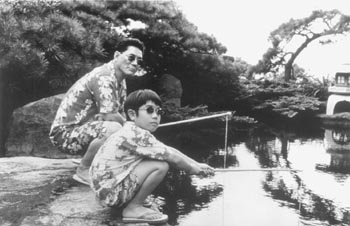![[MetroActive Movies]](/movies/gifs/movies468.gif)
[ Movies Index | Show Times | Santa Cruz Week | MetroActive Central | Archives ]
Weirdly Wistful
Beat Takeshi combines sentiment
with violence in 'Kikujiro'
By Richard von Busack
THE COMBINATION of sentimentality and violence is a potent one in the movies, and Beat Takeshi (a.k.a. Takeshi Kitano) has used it to powerful effect in his weirdly tender yakuza films. The most gentle so far, Kikujiro, plays like a very odd Frank Capra film, all about the rehabbing of a bad man. A penny-ante gangster named Kikujiro (Takeshi) gets a job escorting an unhappy boy named Masao (Yusuke Sekiguchi) to meet the mother he never knew. It's a long trip from Tokyo, and the gangster lenghtens it by stupidly blowing all their traveling money at the race track. The boy and the man cross seemingly all of Honshu by walking and bumming rides. When at last they arrive, the child is disappointed. Kikujiro, who also never really knew his mother, decides to cheer him up by creating an impromptu circus for him. To help out, he enlists a trio of clowns: a traveling poet and a pair of bikers, one a stripling, one a gentle fatty.
Takeshi's visual cleverness is extreme. He sets up a shot from the inside of a champagne glass and shows us a country road reflected in a spinning chrome hubcap. One shot is seen through the multifaceted eye of a passing dragonfly. Takeshi appreciates the green, almost Hawaiian, remote parts of Japan, the roadside farms, the rough county fairs, the corrugated metal bus shelters with 50-year-old advertisements in them.
Takeshi's work is a lament for violence instead of a celebration of it. Through matching sets of flash-forwards and flash-backs, he cuts from a situation that sets up a fight to the broken, unconscious body lying on the ground afterward. The director, poker-faced and yet wounded, still bears the scars of the terrific motorcycle accident he was in a few years ago. The divot out of his cheekbone makes his eyes mismatched. Through his macho unexpressiveness, Takeshi looks as if he were always about to raise an eyebrow. His rolling Popeye the Sailor Man walk (probably another result of the accident) has a bantam rooster's authority. His Kikijuro is accustomed to being obeyed. When he becomes the ringmaster of the little impromptu creekside circus, no act is too humiliating for his trio of volunteers.
Unfortunately, Kikujiro leaves viewers with the cinematic equivalent of a chalky aftertaste. The last third of the film is suffused with imagery of weird clowns and crystal angels. The untranslatability of some Japanese humor is violently apparent here, and the mawkishness that Takeshi has dammed up breaks out and swamps the picture. (Moreover, the little boy isn't an especially effective actor.) This is Takeshi's fifth movie released here, Fireworks being the best. The cult director's work is frustrating. To date, his remarkable capacity for invention is matched with a wistful sensibility that at time seems like delicacy for the sake of delicacy. Homely as the man is, he's just too pretty.
Copyright © Metro Publishing Inc. Maintained by Boulevards New Media.
![]()

Beat on the Road: A gangster (Beat Takeshi) takes a boy (Yusuke Sekiguchi) to meet his mother in the remote regions of Japan in 'Kikujiro.'
Kikujiro (PG-13; 120 min.), directed and written by Takeshi Kitano, photographed by Katsumi Yangishima and starring Beat Takeshi and Yusuke Sekiguchi, opens Thursday at the Nickelodeon in Santa Cruz.
From the June 21-28, 2000 issue of Metro Santa Cruz.